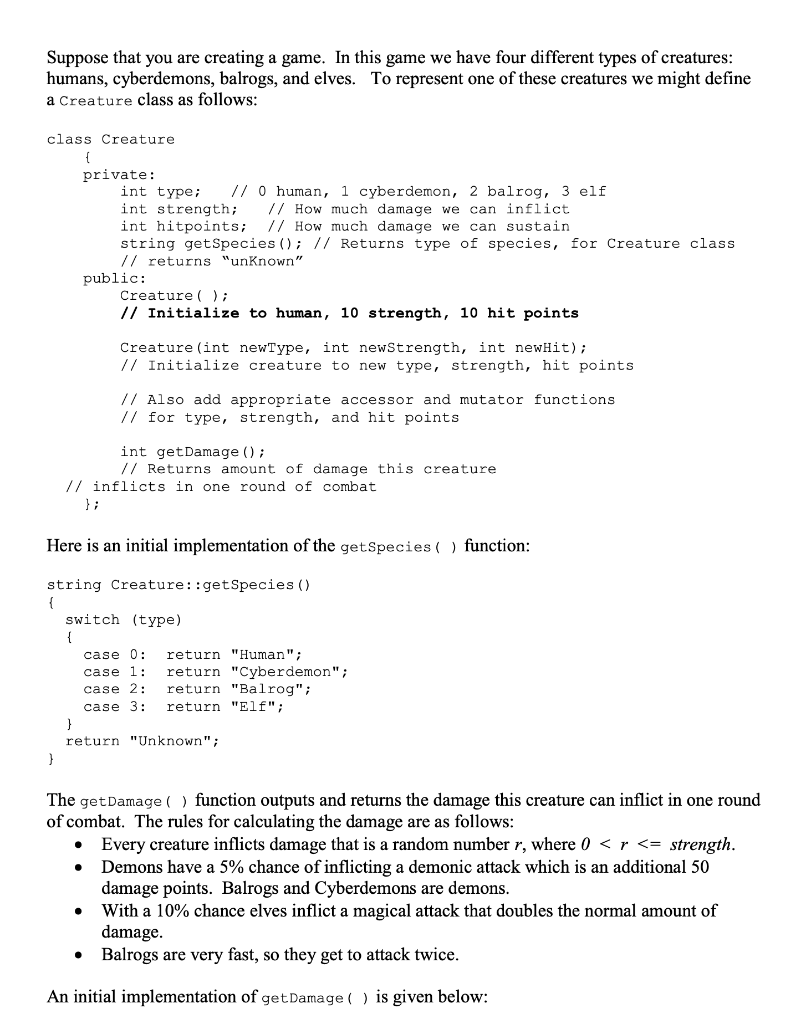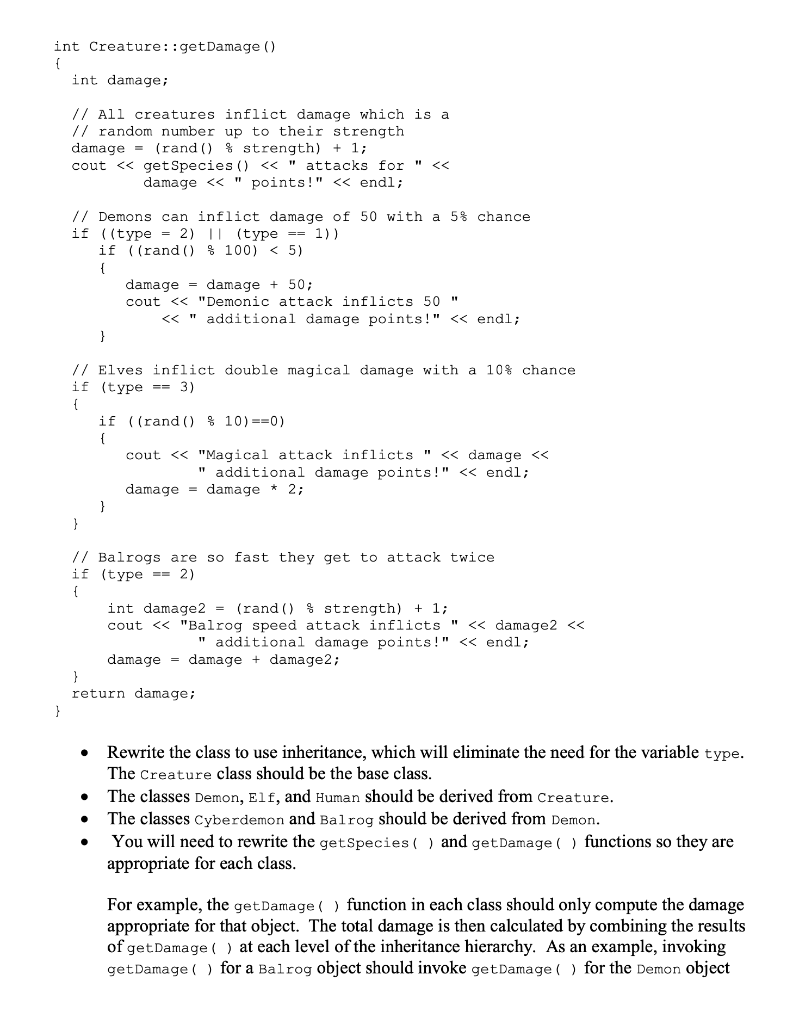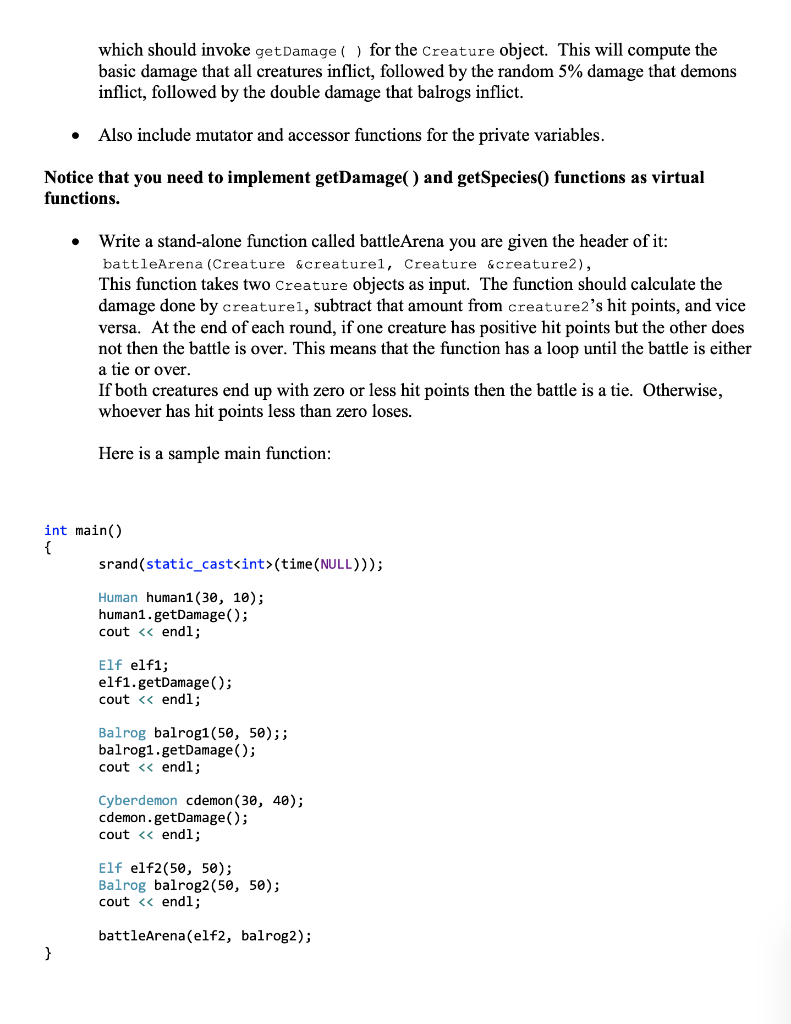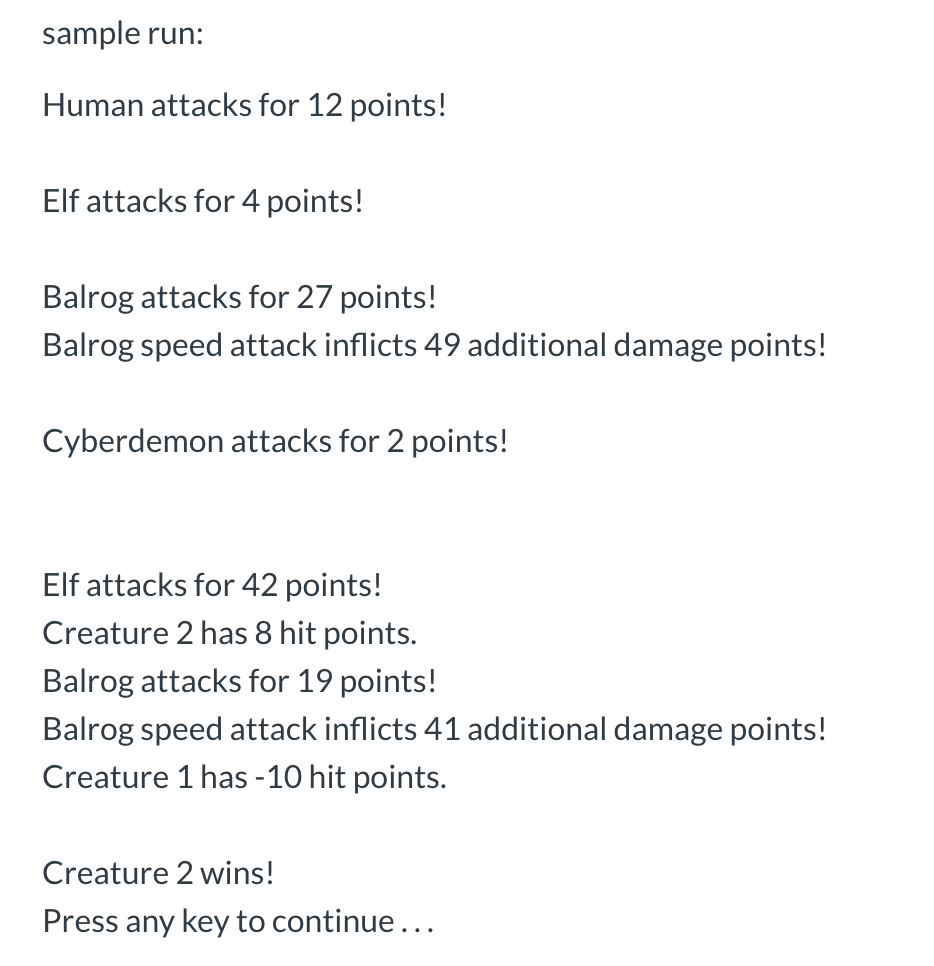Answered step by step
Verified Expert Solution
Question
1 Approved Answer
Suppose that you are creating a game. In this game we have four different types of creatures: humans, cyberdemons, balrogs, and elves. To represent




Suppose that you are creating a game. In this game we have four different types of creatures: humans, cyberdemons, balrogs, and elves. To represent one of these creatures we might define a Creature class as follows: class Creature. { private: } // 0 human, 1 cyberdemon, 2 balrog, 3 elf // How much damage we can inflict int hitpoints; // How much damage we can sustain string getSpecies (); // Returns type of species, for Creature class. // returns "unknown" public: int type; int strength; Creature ( ) ; // Initialize to human, 10 strength, 10 hit points Creature (int newType, int newStrength, int newHit); // Initialize creature to new type, strength, hit points. // inflicts in one round of combat }; Here is an initial implementation of the getSpecies () function: string Creature::getSpecies () { // Also add appropriate accessor and mutator functions // for type, strength, and hit points int getDamage (); // Returns amount of damage this creature. switch (type) { case 0: return "Human"; case 1: return "Cyberdemon"; case 2: return "Balrog"; case 3: return "Elf"; } return "Unknown"; The get Damage () function outputs and returns the damage this creature can inflict in one round of combat. The rules for calculating the damage are as follows: Every creature inflicts damage that is a random number r, where 0 < r int Creature::getDamage () { int damage; // All creatures inflict damage which is a // random number up to their strength (rand() damage strength) + 1; cout < < get Species () < < " attacks for " < < damage < < " points!" < < endl; // Demons can inflict damage of 50 with a 5% chance if ((type = 2) || (type == 1)) if ((rand() %100) < 5) { } // Elves inflict double magical damage with a 10% chance if (type == 3) { damage damage + 50; cout < < "Demonic attack inflicts 50 " < < " additional damage points!" < < endl; if ((rand() %10)==0) { } cout < < "Magical attack inflicts " < < damage < < " additional damage points!" < < endl; damage * 2; damage // Balrogs are so fast they get to attack twice if (type == 2) { int damage2 = (rand() % strength) + 1; cout < < "Balrog speed attack inflicts " < < damage2 < < " additional damage points!" < < endl; damage = damage + damage2; } return damage; Rewrite the class to use inheritance, which will eliminate the need for the variable type. The Creature class should be the base class. The classes Demon, Elf, and Human should be derived from Creature. The classes Cyberdemon and Balrog should be derived from Demon. You will need to rewrite the getSpecies () and get Damage () functions so they are appropriate for each class. For example, the get Damage () function in each class should only compute the damage appropriate for that object. The total damage is then calculated by combining the results of get Damage () at each level of the inheritance hierarchy. As an example, invoking get Damage ( ) for a Balrog object should invoke getDamage () for the Demon object which should invoke get Damage ( ) for the Creature object. This will compute the basic damage that all creatures inflict, followed by the random 5% damage that demons inflict, followed by the double damage that balrogs inflict. Also include mutator and accessor functions for the private variables. Notice that you need to implement getDamage() and getSpecies() functions as virtual functions. Write a stand-alone function called battleArena you are given the header of it: battleArena (Creature &creaturel, Creature &creature2), This function takes two Creature objects as input. The function should calculate the damage done by creaturel, subtract that amount from creature2's hit points, and vice versa. At the end of each round, if one creature has positive hit points but the other does not then the battle is over. This means that the function has a loop until the battle is either a tie or over. } If both creatures end up with zero or less hit points then the battle is a tie. Otherwise, whoever has hit points less than zero loses. Here is a sample main function: int main() { srand(static_cast (time(NULL))); Human human1 (30, 10); human1.getDamage(); cout < < endl; Elf elf1; elf1.getDamage(); cout < < endl; Balrog balrog1 (50, 50) ;; balrog1.getDamage(); cout < < endl; Cyberdemon cdemon (30, 40); cdemon.getDamage(); cout < < endl; Elf elf2 (50, 50); Balrog balrog2 (50, 50); cout < < endl; battleArena (elf2, balrog2); sample run: Human attacks for 12 points! Elf attacks for 4 points! Balrog attacks for 27 points! Balrog speed attack inflicts 49 additional damage points! Cyberdemon attacks for 2 points! Elf attacks for 42 points! Creature 2 has 8 hit points. Balrog attacks for 19 points! Balrog speed attack inflicts 41 additional damage points! Creature 1 has -10 hit points. Creature 2 wins! Press any key to continue...
Step by Step Solution
★★★★★
3.52 Rating (145 Votes )
There are 3 Steps involved in it
Step: 1
class Creature protected int strength int hitpoints public Creatureint newStrength 10 int newHit 10 strengthnewStrength hitpointsnewHit virtual stdstr...
Get Instant Access to Expert-Tailored Solutions
See step-by-step solutions with expert insights and AI powered tools for academic success
Step: 2

Step: 3

Ace Your Homework with AI
Get the answers you need in no time with our AI-driven, step-by-step assistance
Get Started


